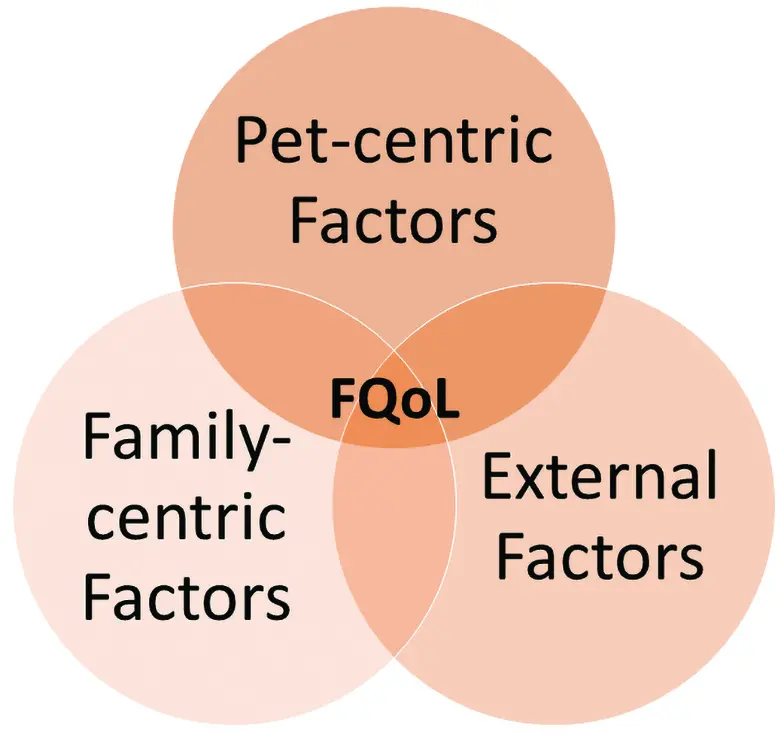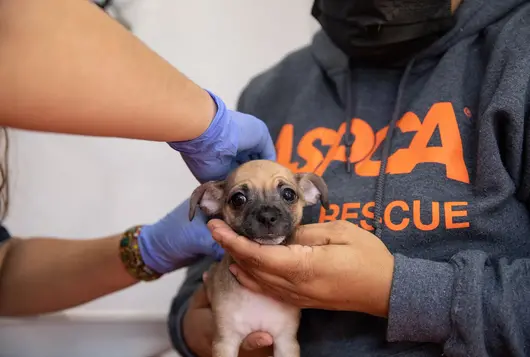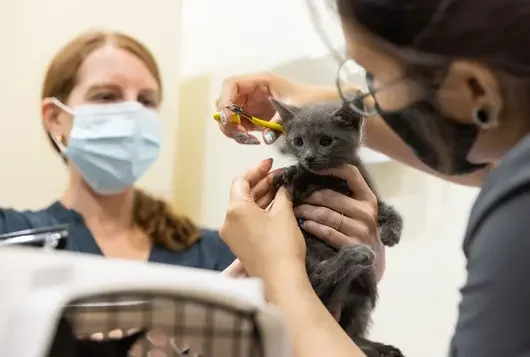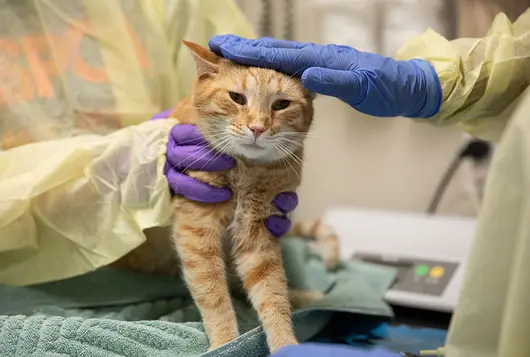Family Quality of Life: Pet Owners and Veterinarians Working Together to Reach the Best Outcomes

Veterinarians have historically focused on providing diagnostic and treatment protocols they believe will provide the best medical outcome for patients without considering other factors that play a role in a family’s pet care decisions. This approach can create a misalignment between the veterinarian’s goals of care for the pet and that of the family. It’s a disconnect that may ultimately affect levels of trust between veterinarians and their clients, creating a barrier to veterinary care.
Tackling this issue is a new article from the ASPCA, co-led by Dr. Carolyn Brown and Selena Edwards from Community Medicine and Dr. Sharon Pailler from Strategy & Research, with contributions from other ASPCA colleagues. The article, published in the online Journal of the American Veterinary Medical Association (JAVMA), explores the interdependence of families and their pets and the factors pet owners consider when making care decisions on behalf of their animals. It also provides recommendations that enable veterinarians to better support their clients and reduce ethical dilemmas regardless of the course of treatment chosen.
Background
A previous article—authored by Dr. Brown and Dr. Pailler of the ASPCA—suggests that veterinarians should present their clients with a spectrum of diagnostic and treatment options that range from the most expensive and advanced procedures to the least costly, but still effective, and that they provide options that align with a family’s goals of care for their pet.
In human health, Family Quality of Life (FQoL) is described as the “sense of well-being of the family, collectively and subjectively defined and informed by its members, in which individual and family level needs interact.” For pet owners, FQoL considers a family’s financial resources, the time a pet owner can devote to treating a sick pet, access to transportation for appointments, and the stress of hospitalization (on both the pet and the owner), as well as many other factors.
While pets are an integral part of the family and must be included in evaluating FQoL, the ASPCA team found no literature about FQoL and its impact on veterinary decisions. The ASPCA team suggests three inter-related domains that influence FQoL: Pet-Centric Factors (physical and behavioral health), Family-Centric Factors (resources, culture, values, and history), and External Factors (housing restrictions, social service provider requirements, and animal control regulations).
“When veterinarians and pet owners understand the role FQoL plays in their decision making, the result can be a less stressful experience for the veterinarian, the client, and the pet.”
FQoL Domains
Pet-centric factors include the pet’s medical condition, behavior, stress, fear, and anxiety levels, as well as their overall happiness and quality of life.
Family factors that influence pet care decisions include interactions with other pets and human and veterinary care professionals, as well as the family’s values, religion, and culture. The family may also consider resources like money, time, and available transportation. These resources change over time and are affected by life events such as job loss, illness, relocation, starting a family, or losing a family member.
Forces outside the family also affect FQoL, including levels of social support and the availability of friends and family to help with the pet’s care. Landlords or insurance companies that impose breed or weight restrictions on pets, law enforcement, animal control, and other authorities that may exert pressure on pet owners through costly citations, penalties, vaccine or spay/neuter mandates, and licensing requirements also need to be considered.
“Factors that affect FQoL are often nuanced, cumulative, and layered,” says Dr. Brown. “Our paper presents examples that highlight these subtleties and how their interconnectedness influences positive and negative factors of FQoL.”
Challenges to FQoL
Veterinarians may make inaccurate assumptions when families choose not to share information about the factors influencing their FQoL. To a veterinarian, an owner’s decisions may seem counterintuitive or puzzling.
Clients may ask their veterinarian how they would address the same complex care decision for their pet. Veterinarians have inherent advantages in caring for their pets, including their training and education, which provide a deep understanding of medical conditions, the ability to bring their pet to work, having colleagues who are experts and are willing to assist, and paying reduced costs. These factors can decrease a veterinarian’s ability to appreciate the challenges owners face.
Solution & Takeaways
Increasingly sophisticated and costly veterinary diagnostic and treatment capabilities can present dilemmas for pet owners as they grapple with their ability to provide care for their pets without sacrificing their FQoL. Veterinarians may falsely see these choices as binary—benefitting the pet or the family. When FQoL is acknowledged, the interests of the pet and family are evaluated holistically with consideration of the many interdependencies that exist between people and their pets.
“Reframing veterinary care decisions in the context of FQoL can give veterinarians the confidence and motivation to offer and provide alternate evidence-based options proactively,” says Dr. Brown. “When veterinarians and pet owners understand the role FQoL plays in their decision making, the result can be a less stressful experience for the veterinarian, the client, and the pet.”
Being aware of the factors that comprise FQoL—and openly discussing them—can increase veterinarians’ empathy toward clients. Veterinarians may experience less moral distress and burnout from understanding that they are not only helping the pet but also the family. Families benefit by feeling accepted, supported, and no longer guilty or anxious about their decisions.
While FQoL is often overlooked in the clinical setting, discussing it with clients can improve the veterinarian-client relationship and outcomes for families and pets.
We have lots more on this subject:




